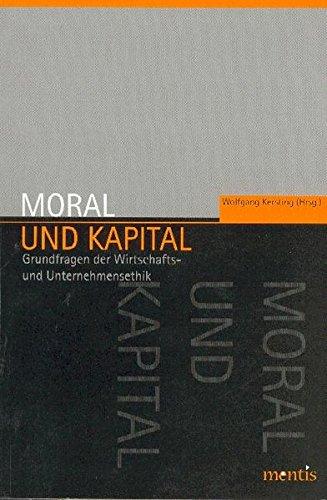Gespeichert von literature am

This chapter is about ethics and investments and how ethics play a role in economical transactions.
The author firstly talks about that promise is the minimal ethic in business.
Every economical transaction relies on a promise and the feeling that promises will be kept. If the feeling arises, that promises will not be kept, than there won't be any promises and thus no economical transaction. For this reason economical transactions and the promises behind them are controlled by the law. The judge will decide, if the promise was kept or not.
Promises rely on trust, but economists do not rely on trust. If a partner of an economical transaction does not fulfill the promise, he/she will suffer a sanction from the economists. This will not only break the partnership but the credibility of the partner, who broke the promise, will also suffer.
Therefore it will be harder for him/her to get new jobs.
The author talks furthermore that every partner of an economical transaction needs to have a profit of his promise. If not, not only he will suffer but everyone, since the effort, the partner puts into keeping his promise will be low and thus the quality of the outcome will be low.
It is also important that everyone will gain a similiar level of a profit. If not, again the quality of the outcome will suffer, which would damage every partner of the economical transaction.
But why would someone decide to keep a promise?
Because everyone has the the following thought:
What if i do not keep my promise and everyone else keeps his/her promise?
I will look like a 'bad' person and noone will trust me.
In the last part the author talks about Honor and how it affects economical transactions
If someone loses his "honor", its more than he is losing profit, he loses his personality. So therefore he will do everything to regain his "honor", also to gain a better image.
Therefore, not every economical transaction someone does is just for profit. Sometimes its also only for a better image.
The Author had these values in mind: Credibility, trust and honor.
All these values are important in making and keeping promises. Since promises are the basis of every economical transaction, these values are also very important for economical transaction. Not keeping the promise leads to suffering of one’s credibility and honor, which then can lead to a loss of one’s view of himself/herself. As mention above, if everyone but one does not keep the promise, that one will see himself lower than the others and will see his actions as ‚bad‘. So therefore most promises will then not be kept, because one wants to but because one thinks of the consequences if the promise is not kept.
This exact thought is important for economical transactions between organizations. An organization does not keep its promises, because it is ethical correct, but because there will be consequences, which would lead to a loss in profit and credibility, if the promise is not kept. This feeling of having to keep a promise builds the basis of promises. If this feeling would not exist, there would be no promises, because there is no trust. But this seems odd, since the promises do not base on trust, but on fear to suffer consequences.


